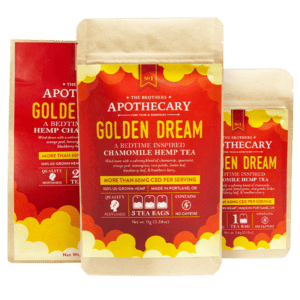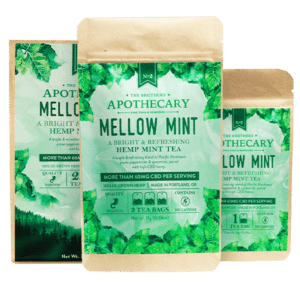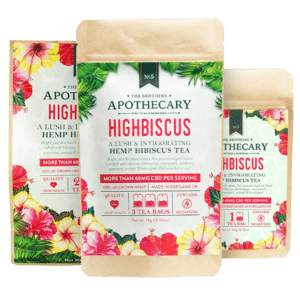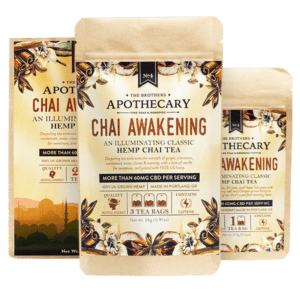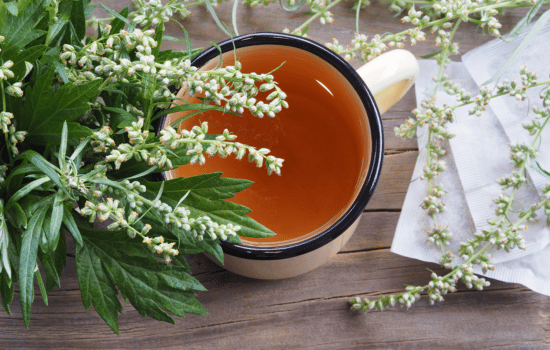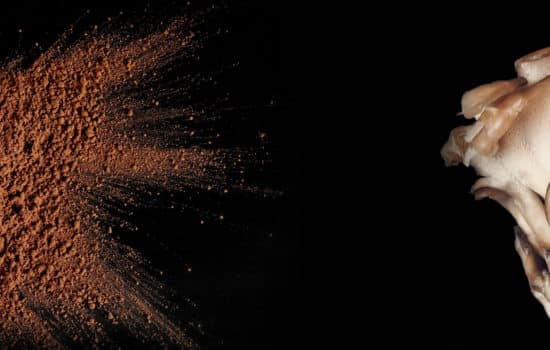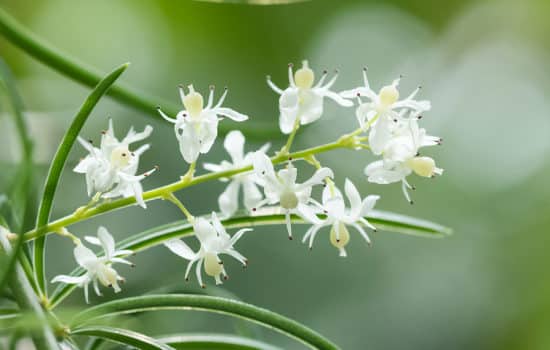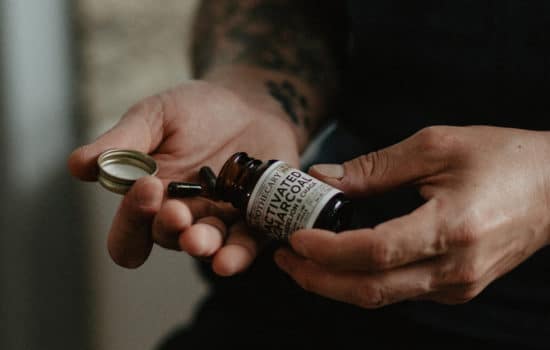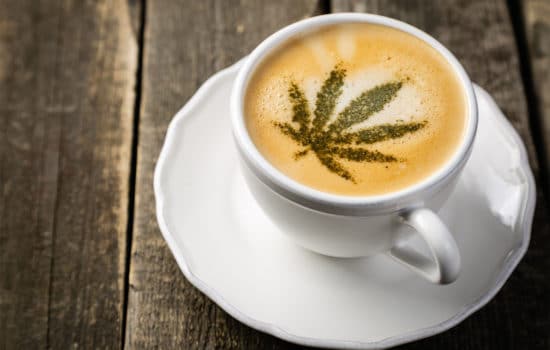If you’re familiar with CBD, you may know that there are three main types of CBD available: isolated CBD, broad-spectrum CBD, and full-spectrum CBD. Many users prefer full-spectrum CBD, but what exactly sets it apart? Read on to find out with The Brothers Apothecary!
What Is Full-Spectrum CBD Oil?
Also known as whole plant CBD, full-spectrum CBD oil extracts from the hemp plant that contains many compounds natural to the cannabis plant.
While other types of CBD filter out certain compounds, full-spectrum CBD keeps all of the plant’s cannabinoids, terpenes, flavonoids, and healthy fatty acids intact.
What Cannabinoids Are Included?
CBD, or cannabidiol, is actually only one of more than 100 known cannabinoids. And while full-spectrum CBD extract mostly consists of CBD, small amounts of all other 100+ cannabinoids are included.
The cannabinoid most people really want to know about, though, is THC.
THC, or Tetrahydrocannabinol, is one of the better-known cannabinoids, as it can cause the psychoactive effects associated with cannabis. So, to answer your unspoken question: yes, THC is included in full-spectrum CBD, but in extremely low amounts.
As of the 2018 Farm Bill, federally legal hemp can only contain up to 0.3% THC content in its dry weight. That means that any federally legal CBD product you use won’t have more than that 0.3% THC content.
Along with THC, full-spectrum CBD contains other beneficial cannabinoids such as CBN and CBG.
Does Full-Spectrum CBD Oil Cause a High?
Full-spectrum CBD oil cannot cause a high, even when taken in large doses, with a small amount of THC. CBD is not psychoactive and won’t lead to any altered mental state because of how CBD interacts with the body’s endocannabinoid system – which helps maintain balance within the body.
And, while THC can cause psychoactive effects by binding to cannabinoid receptors in the brain, it would take a much higher dose of THC than you could conceivably obtain from a full-spectrum CBD oil to produce those psychoactive effects.
How Is Full-Spectrum CBD Extracted?
Full-spectrum CBD is extracted using a process called supercritical CO2 extraction. This method uses high temperatures and pressure to cause carbon dioxide to break down and dissolve parts of the hemp plant, allowing the cannabinoids and other compounds to be separated from the rest.
Unlike for broad-spectrum or isolated CBD, none of the natural plant parts are filtered out of the extracted plant molecules during or after the extraction process.
From there, the extracted CBD molecules are combined with a carrier oil such as hemp or coconut oil, which helps the body effectively absorb the CBD into the bloodstream.
How Does Full-Spectrum CBD Oil Differ from Broad-Spectrum?
The difference between full-spectrum and broad-spectrum CBD is a simple one: THC.
In broad-spectrum CBD, all THC molecules are filtered out during the extraction process. The other plant parts found in full-spectrum CBD, though, are still included in broad-spectrum CBD.
Broad-spectrum CBD is a great option for anyone sensitive to THC or is worried about the possibility of THC showing up on a drug test. This is unlikely to happen with full-spectrum CBD, but it is possible if enough THC is present.
How Potent Is Full-Spectrum CBD Oil?
While potency varies based on the specific product and amount of CBD included per serving, full-spectrum CBD is considered more potent than other types of CBD due to the inclusion of other beneficial cannabinoids and terpenes.
What Does Full-Spectrum CBD Oil Feel Like?
Because CBD can provide a boost to the endocannabinoid system, CBD oil can help promote relaxation throughout the body, calm the mind, ease tension, and soothe generalized discomfort.
And what really sets full-spectrum CBD apart is its ability to produce the entourage effect. The entourage effect is what happens when the different cannabinoids work together and feed off of one another to strengthen the effects of each.
Basically, full-spectrum CBD takes them to the next level for any of the benefits you can expect to reap from CBD, full-spectrum CBD takes them to the next level.
How Can I Use CBD Oil?
You can take CBD sublingually (under the tongue), or mix it into a favorite food or drink. CBD oil is also a great option if you’re newer to CBD, as the dropper included makes it easy to measure out and adjust the exact dose as needed.
If taking sublingually, you’ll want to place a few drops of CBD oil directly under the tongue and hold there for 90 seconds before swallowing. While this is the fastest way to enjoy the effects of CBD oil, some people prefer to mix the oil into a coffee, smoothie, salad dressing, nut butter, or other types of food.
This method helps mask the earthy taste of CBD oil, which–we gotta admit–not everyone enjoys.
How Long Will It Take Until I Feel the Effects?
When taken sublingually, CBD oil can kick in within 15 to 30 minutes, as the CBD is absorbed through tiny blood vessels in the mouth.
When consumed with food or drink, the CBD oil passes through the digestive tract before reaching the bloodstream, so you may not feel the results for 45 minutes to an hour.
The effects of CBD oil usually last for anywhere between four and eight hours after kicking in.
Can Full-Spectrum CBD Oil Be Applied Topically?
Full-spectrum CBD oil can be used topically to tend to localized discomfort or help soothe irritated skin.
Topical CBD oils like our Pain Away Roller often contain other ingredients that help nourish the skin or alight the senses, such as essential oils or aloe.
Are Full-Spectrum CBD Edibles or Topicals More Effective?
Full-spectrum CBD edibles and topicals are both highly effective. It really just comes down to your own personal preferences and individual needs.
CBD topicals kick in quickly (often within minutes) and can be reapplied as needed, since it isn’t absorbed into the bloodstream. This makes full-spectrum topicals great for providing fast-acting relief for localized discomfort that may flare up throughout the day.
The effects of CBD edibles, on the hand, take longer to kick in, but they also last longer. Full-spectrum edibles can help ease generalized tension and discomfort throughout the body as they move through the bloodstream.
And since CBD and THC cannabinoids from full-spectrum edibles can work with endocannabinoids and cannabinoid receptors in the brain, they can also provide further support in easing mental stress and promoting a sense of calm.
Regardless of which you use, you’ll feel the benefits of the entourage effect as the phytocannabinoids work their way into your body’s endocannabinoid system!
How Much Full-Spectrum CBD Oil Should I Take?
There is no single standard dose of CBD, as everyone feels the effects at different amounts.
Typically, though, an average dose of CBD is 20 to 50 milligrams.
If you haven’t used CBD before, we recommend starting with about ten milligrams. Then add another five to ten milligrams per day until you feel the desired effects. This will help you pinpoint exactly how much CBD you need to feel the effects.
While everyone is different, an average dose of CBD is 20 to 50 milligrams. Most people don’t need more than 150 mg per day to feel the benefits.”
Are There Any Side Effects?
CBD is considered extremely safe, with only rare and minor side effects reported. Often, side effects occur when taken in high doses. Side effects associated with consuming too much CBD may include:
- Tiredness
- Dry mouth
- Nausea
- Diarrhea
- Changes in appetite
- Dizziness
To help avoid any of these side effects, we recommend keeping your daily CBD intake under 150 milligrams. Only use high-quality and third-party tested products to ensure your product is safe, accurately labeled, and free of any heavy metals or pesticides.
The Bottom Line
Full-spectrum CBD oil is an easily accessible way to enjoy the benefits, along with the heightened benefits of the entourage effect!
You can find a wide variety of organic, locally-sourced, and third party tested full-spectrum CBD products here at The Brothers Apothecary.
And, if you’d rather a product without THC, don’t worry–we have those at our shop too!
Sources
Cannabinoid receptors: where they are and what they do | Journal of Neuroendocrinology
Jesse Richardson is the co-founder of The Brothers Apothecary. He's an avid tea drinker and the primary creator behind The Brothers' products. An undergraduate of UCLA for Political Science, Jesse currently studies Medicinal Plants at Cornell University and The International School of Herbal Arts & Sciences.



